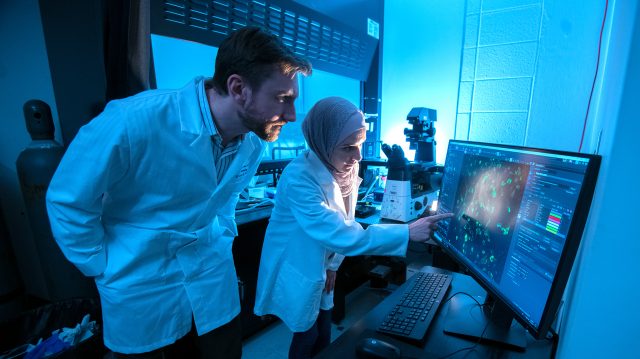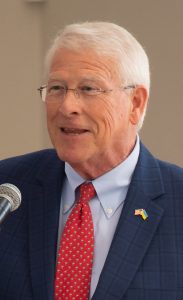
A UM-led consortium has received a federal grant to develop a regional strategy for the advancement of biomanufacturing capabilities. The Southeast Biotech Collaborative will use this funding to recruit biomanufacturing companies to the region, improve access to capital, augment workforce development capabilities and support commercialization. Photo by Kevin Bain/Ole Miss Digital Imaging Services
OXFORD, Miss. – The University of Mississippi has launched the Southeast Biotech Collaborative, or SEBC, a consortium of more than 30 public and private organizations across the Southeast that are leading an effort to develop a regional strategy for the advancement of biomanufacturing capabilities.
The U.S. Department of Commerce’s Economic Development Administration announced today (Oct. 23) that it has awarded a Phase 1 Strategy Development Grant to the SEBC to achieve this goal. The consortium was selected for the funding from a competitive pool of 181 applications.
“This is an incredibly exciting day for the University of Mississippi and other members of the SEBC,” UM Chancellor Glenn Boyce said. “The students in this region are some of the best and brightest in the United States.
“This program is an investment in them and will support their ambitions of starting, building and catalyzing an ecosystem of innovation in the region.”
This federal investment will support strategy development to grow the region’s biomanufacturing capabilities over the next 5-10 years. The funding will enable the SEBC to conduct several strategy activities, including developing comprehensive plans to recruit biomanufacturing companies to the region, improve access to capital, augment workforce development capabilities and build commercialization mechanisms.
The Tech Hubs Program, created under the CHIPS and Science Act, awarded the grant. By investing in U.S. regions, the program aims to transform them into globally competitive innovation centers.
“The Southeast Biotech Collaborative is on the path to transforming research and development in our region,” said U.S. Sen. Roger F. Wicker (R-Miss.). “This planning grant is a positive step that will help this Mississippi-led coalition compete on a global scale.”
The SEBC’s mission is to boost biomanufacturing capabilities, reduce drug shortages and ensure U.S. leadership in biotechnologies. As part of the mission, SEBC members are actively collaborating to accelerate and deploy technological advancement in biomanufacturing, biologistics and precision population health for next-generation competitiveness in biotechnology by building off the region’s strengths, closing regional gaps, powering bi-directional commercialization activity and de-risking tech transfer.
Bill Cook, a technology entrepreneur from Oxford, serves as SEBC chairman.
“This is a once-in-a-generation opportunity to boost the economic future of the region and onshore manufacturing of key biotechnology products and components,” Cook said. “This award is an endorsement from the U.S. government for the SEBC’s mission and we expect additional private partners to join in the effort in light of this announcement.”
The university serves as lead consortium member, and planned activities include:
- Recruiting biomanufacturing and biologistics companies to the region through incentives and other support
- Improving access to capital for biotech startups and scaleups through new funding channels and investor networks
- Expanding workforce training programs and building talent pipelines to meet demand for biotech skills
- Developing commercialization infrastructure to help researchers launch startups and transfer IP out of universities
- Targeted development of sites, facilities and infrastructure to support the biotech hub
Members of the SEBC include private sector companies, state governments, trade associations, institutes of higher education, investment firms, historically black colleges and universities, tribal governments, economic development organizations and workforce groups.
For more information on the SEBC, visit http://www.southeastbiotech.org or contact Matt Gallivan at 952-836-4602 or matt.gallivan@leavittpartners.com.

